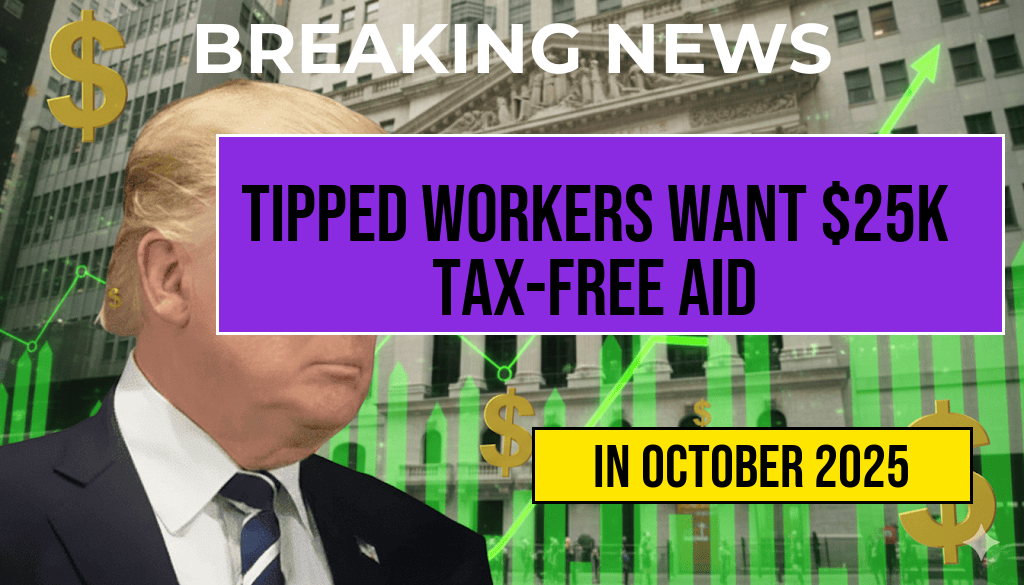As the debate over fair wages continues, tipped workers across the United States are advocating for a tax-free allowance of $25,000. However, this push for increased financial support comes with a significant trade-off: many workers risk losing over $1,000 in Earned Income Tax Credit (EITC) benefits. This complex situation highlights the challenges faced by those in the service industry, where income can fluctuate dramatically based on tips and customer demand. Advocates argue that the current tax structure disproportionately affects low-income workers who heavily rely on tips to supplement their wages. Meanwhile, opponents warn that any changes to tax regulations could unintentionally undermine crucial benefits that help lift families out of poverty.
Understanding the Tipped Wage System
In many states, tipped workers are subject to a lower minimum wage than their non-tipped counterparts. This wage disparity often results in a reliance on tips to achieve a livable income. According to the U.S. Department of Labor, the federal minimum cash wage for tipped employees is $2.13 per hour, a figure that has not changed since 1991. The expectation is that tips will bridge the gap, but this system often leads to inconsistent earnings and financial instability.
The $25,000 Tax-Free Proposal
The proposal for a $25,000 tax-free allowance aims to provide financial relief to tipped workers, allowing them to retain more of their earnings without the burden of taxation. Advocates believe this change could elevate the economic status of service workers, especially in sectors like restaurants and hospitality, where tips can make up a significant portion of income. Proponents argue that making this allowance tax-free would offer immediate relief, contributing to overall economic stability.
Potential Loss of EITC Benefits
However, the proposal has sparked concerns regarding its impact on the EITC. The EITC is a federal program designed to assist low to moderate-income working individuals and couples, particularly those with children. The credit can amount to thousands of dollars, providing essential support for families striving to make ends meet.
- For tax year 2023, the maximum EITC for a family with three or more children is approximately $7,430.
- Workers earning more than a certain threshold could see their EITC benefits reduced or eliminated entirely.
- In some cases, workers could lose up to $1,000 in EITC benefits if their total earnings exceed eligibility limits.
This potential loss raises critical questions about the long-term implications of the proposed tax changes. While the tax-free allowance could offer immediate benefits, the risk of losing valuable credits may deter some workers from fully supporting the initiative.
Impact on Workers and Families
The impact of these changes could be profound for many families. Tipped workers often juggle multiple jobs or hours to make ends meet, leading to stress and financial uncertainty. Losing EITC benefits could exacerbate these challenges, especially for those who depend on the credit to afford basic necessities like food, housing, and childcare. The situation becomes even more complicated when considering local and state laws that may further affect tipped wages and taxation.
Community Reactions
Reactions from the community are mixed. Many service workers express hope that the proposed tax-free allowance will provide much-needed financial relief. Others voice concerns about the potential loss of benefits that help supplement their income.
- Supporters argue that the tax-free allowance is a necessary step toward equity and fairness in the workplace.
- Critics warn that the proposal could create more significant financial challenges for low-income families.
As discussions continue, local advocacy groups are stepping up to educate workers about their rights and the potential implications of these proposed changes. It remains to be seen how policymakers will address the complexities of this issue, balancing the needs of tipped workers with the imperative to protect essential benefits.
Looking Ahead
As the conversation surrounding tipped wages and tax policies evolves, it is crucial for stakeholders, including workers, employers, and policymakers, to engage in open dialogue. Addressing the financial challenges faced by tipped workers while ensuring the preservation of vital benefits like the EITC will require collaborative efforts and thoughtful solutions. The path forward may involve exploring comprehensive reforms that not only support workers but also foster a more equitable labor market.
For more information on the EITC, visit the IRS website. For insights on the current state of tipped wages, consult the Economic Policy Institute.
Frequently Asked Questions
What is the proposal for tipped workers regarding tax-free earnings?
Tipped workers are seeking to earn $25,000 in tax-free income, which would help them maintain a stable income without the burden of taxes on those earnings.
How could this proposal affect the Earned Income Tax Credit (EITC) benefits?
While the proposal for $25,000 tax-free income seems beneficial, it could lead to a loss of over $1,000 in EITC benefits for many workers, as their eligibility for the credit is based on reported income.
What is the Earned Income Tax Credit (EITC)?
The Earned Income Tax Credit (EITC) is a federal benefit designed to assist low-to-moderate income working individuals and families by reducing their tax burden and providing refunds.
Why are tipped workers particularly concerned about this issue?
Tipped workers are concerned because the proposed tax-free earnings could significantly impact their overall income, especially since losing EITC benefits could lead to financial instability.
What are the potential implications of this tax proposal for the restaurant industry?
If implemented, the tax proposal could shift the financial landscape for the restaurant industry, affecting how tipped workers report income and potentially influencing hiring and wage structures.






